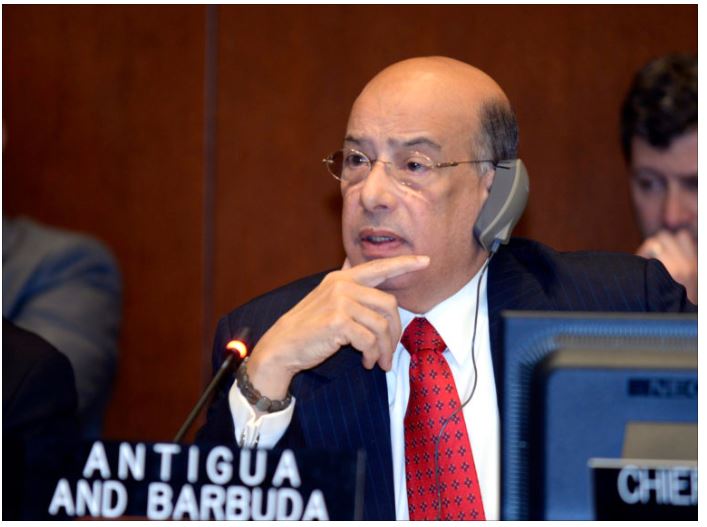By George C. Brathwaite (PhD)
“Today, no leader can afford to be indifferent to the challenge of engaging employees in the work of creating the future. Engagement may have been irrelevant in the industrial economy and optional in the knowledge economy, but [in today’s creative economy] it’s pretty much the whole game now.” – Professor Gary Hamel of the London Business School.
Every day since May 25th and the swearing in of Barbados’ eighth prime minister, ‘engagement’ has been palpably visible in Barbados. Engagement with citizens and stakeholders, individuals and groups, and with regional and international entities has been forthcoming. Furthermore, the feature of engagement also implies that the characteristics of a national leader matters. Professor Hamel, in connecting leadership and engagement, identified five paramount issues that are essential: values, innovation, adaptability, passion, ideology. Space does not allow for a full discussion on these dynamics, but enough will be said to indicate that even against simple explanations, the importance of these itemized basics to leaders’ engagement can be meaningfully understood.
In speaking of values, attention is drawn to the necessity to equip oneself with integrity and sound ethical practices, given the waning of public morality and reasonableness in the public sphere. Innovation connotes the individual responsibility to be objectively critical while being creative in determining alternatives and solutions. Adaptability is a necessary ingredient given that the world in which we live is dynamic and change is practically constant. Hence, there must be a strong sense of nimbleness, maneuverability, and a reluctance to be paralyzed by inertia.
The concept of passion is to ensure that our existence is inspired, and that our activities are motivated and honed to success by finding ‘new ways to rouse the human spirit’. The ideology that drives our efforts must be sufficiently compelling as to cherish our attained freedoms and the right of self-determination. Overall, national and civic leaders must never abandon the concert of principles that encourage trust, thus leading to the type of enhanced cooperation and providing for security, prosperity, well-being, and opportunity.
Today, the story that is unravelling in Barbados is inspiring. The one-month old Government is adaptive to the foremost interest of the masses and the leadership is deliberately informative and engaging. Prime Minister Mia Mottley has wittingly wrapped herself around the fundamentals of expressing a clear vision, implanting values, being creative, pliant, and inspired to achieve unprecedented successes at the individual and national levels.
Indeed, with the quest for good and effective governance, PM Mottley is focused both on people and on the policy process. The policy process may be defined as the administrative, organizational, and political activities and attitudes that shape the transformation of policy inputs into outputs and impacts. Thus, Barbadians are observing daily, the kind of public administration and policy processes that augur well for national development due to the deliberate method of engagement.
Public administration is described to be ‘the management of the whole set of government activities dealing with the implementation of laws and regulations, making and implementation of policies and decisions, and the provision of public services’. These things are crucial for Barbados. Thus, the practice of respectable public administration coincides with Prime Minister Mottley’s robust efforts to engage the national constituents for the good governance of Barbados. Miss Mottley demonstrates alongside her team, the active personification of a caring government that is responsive to the needs and expectations of the population.
Moreover, this new Barbados Government is showing deep commitment to reverse the vexing trends and mismanagement practices that festered under the previous administration. Transparency and accountability are clear signposts that the Mottley-led administration has chosen for meeting the day-to-day challenges which confront Barbados. Arguably blessed with the acumen of a communicative style, PM Mottley has been forthright in bringing the most crucial matters to the public’s attention. One example is the true state of the Barbados economy, and her government’s intent to restructure the national debt while repositioning itself for economic growth under an International Monetary Fund (IMF) program.
Additionally, PM Mottley understands the right for the people to have authentic information. Miss Mottley has already reformulated the Government Information System (GIS) whereby, there is the provision of adequate information relating to the governance of Barbados, and knowledge on the projects being undertaken by the various Ministries. The promise of greater citizen participation is encouraged with a system soliciting feedback and encouraging persons to submit their ideas to a listening Government. Dialogue as seen with the ‘Social Partners’ has drastically improved in mere weeks much to the satisfaction of representatives comprising government, business, and trade unions.
Notwithstanding, PM Mottley is also aware of the risks and perils that rest in the vacuum of ignorance and the shadows of speculation. Official reports such as those previously delivered by the Auditor General and the Public Accounts Committee, combined with unofficial statements reveal that in past years, Barbados’ institutions and the civil service increasingly suffered from system failure involving the following:
- Inadequate attention to achieving government policy and delivering pre-determined goals and targets;
- Inability to cope with the changing environment;
- Needless and time-consuming procedures (over bureaucratization and duplication);
- Inadequate delegation;
- Poorly trained and/or demoralized staff;
- Increasing incidence of corrupt and/or fraudulent practices;
- And, inadequate and/or inappropriate skills among managers and staff.
Miss Mottley and her executive are today standing on the right side of law and ethics. Although raising several concerns about the misfeasance done in corridors of stealth, conjecture, shady communications and eleventh hour contractual arrangements, preceding May 24th, 2008, Miss Mottley recognises that it is ‘our responsibility’ to engage with the public and take the appropriate action in the name of resolute public administration and good governance.
To that end, the assertive prime minister instructed her Ministers and civil servants that all official governmental business must be conducted via the secure technological platform for which the Government has invested. This means that all Government business should be conducted via official emails only. Miss Mottley added that neither she nor her Ministers would be holding meetings to conduct the business of Government without public officers being present.
According to the confident leader, “the notion that persons can meet politically in an office to discuss the business of Barbados without public officers cannot happen because we put ourselves at risk of two things.” PM Mottley cited ‘allegations of corruption’ and the matter of who will ‘follow up’ from the proceedings of any held meetings. In her explanations, the popularly elected leader suggested that “if you are in meetings all day and you don’t have a public officer with you, who is going to follow up?” She elucidated on this point by highlighting that “the role of the public officer is to execute the policy and the decisions pertaining to policy that have been made.”
Therefore, it is a matter of practical purpose and safeguard that the presence of public officers become more pertinent in the scheme of transparency and accountability. PM Mottley’s engagement for purposeful public administration ought to be commended by the population. Nevertheless, it is important that we all remember the words of Hannah Arendt: “Political questions are far too serious to be left to the politicians.”
(Dr George C. Brathwaite is a part-time lecturer at the University of the West Indies, Cave Hill Campus, and a political consultant. Email: [email protected]).



